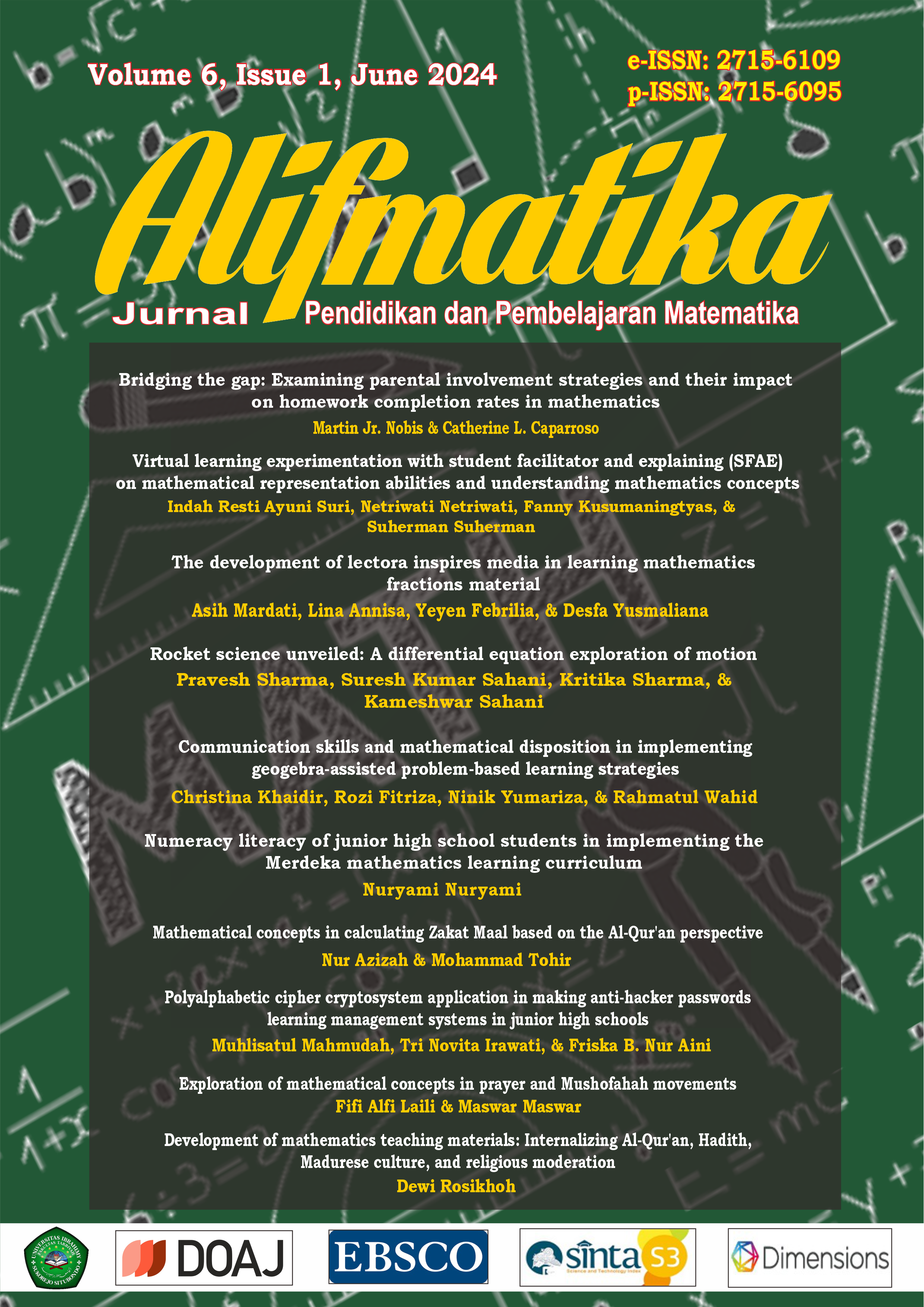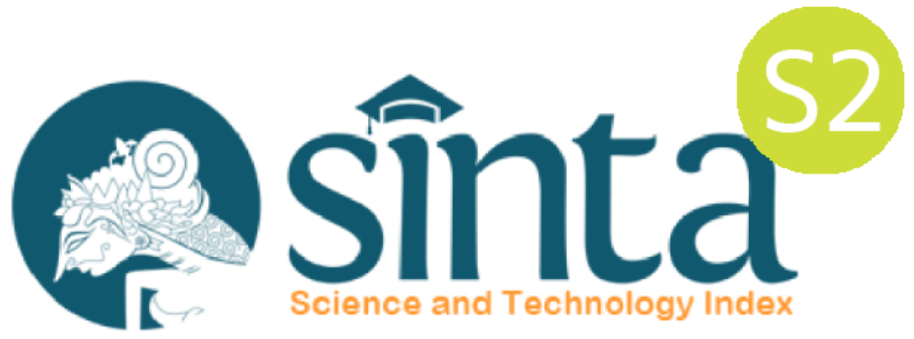Bridging the gap: Examining parental involvement strategies and their impact on homework completion rates in mathematics
DOI:
https://doi.org/10.35316/alifmatika.2024.v6i1.1-13Keywords:
Engagement Motivation, Mathematic homework completion, Parental involvement, Student success, Supportive environmentAbstract
This research examines the influence of parental involvement tactics on students' mathematics homework completion rates, aimed at pinpointing crucial factors and evaluating the efficacy of such strategies. Utilizing a qualitative-quantitative approach, including with students, parents, and teachers, the study identifies distractions, workload, family obligations, and insufficient teacher support as significant barriers to mathematics homework completion. Time management, comprehension, and fatigue also play minor roles. The findings indicate that targeted parental involvement strategies can significantly enhance completion rates, with effective methods including accessible support, designated study spaces, breaking down assignments, fostering student autonomy, and leveraging technology. Additionally, parental involvement fosters stronger parent-child relationships, boosts student confidence, and promotes a positive attitude toward mathematics. To create a conducive learning environment, schools, teachers, and parents should collaborate, implementing recommendations such as creating quiet areas, promoting digital detox initiatives, managing workload, offering targeted support, establishing study environments, and setting clear expectations for mathematics practice.
Downloads
References
Alias, N. Z., Kamal, S. S. L. A., Jamil, H., & Abdullah, M. K. K. (2023). A systematic review of understanding parental involvement in children’s ESL learning: What the literature says? International Journal of English Language and Literature Studies, 12(2), 172–183. https://ideas.repec.org/a/asi/ijells/v12y2023i2p172-183id4810.html
Allee-Herndon, K. A., & Roberts, S. K. (2019). Poverty, self-regulation and executive function, and learning in K-2 classrooms: A systematic literature review of current empirical research. Journal of Research in Childhood Education, 33(3), 345–362. https://doi.org/10.1080/02568543.2019.1613273
Cosso, J., von Suchodoletz, A., & Yoshikawa, H. (2022). Effects of parental involvement programs on young children’s academic and social–emotional outcomes: A meta-analysis. Journal of Family Psychology, 36(8), 1329. https://doi.org/10.1037/fam0000992
Crocker, T., & Kleitsch, D. (2023). The ‘Homework Gap’and Academic Achievement in High School Science: An Ecological Perspective for Policymakers and Practitioners. National Youth Advocacy and Resilience Journal, 6(1), 1–31. https://doi.org/10.20429/nyarj.2023.060101
Cui, Y., Zhang, D., & Leung, F. K. S. (2023). The influence of parental educational involvement in early childhood on 4th grade students’ mathematics achievement. Developing Culturally and Developmentally Appropriate Early STEM Learning Experiences, 32(1), 113–133. https://doi.org/10.1080/10409289.2019.1677131
Epstein, J. L., & Van Voorhis, F. L. (2010). School counselors’ roles in developing partnerships with families and communities for student success. Professional School Counseling, 14(1), 2156759X1001400102. https://doi.org/10.1177/2156759X1001400102
Erdem, C., & Kaya, M. (2020). A Meta-Analysis of the Effect of Parental Involvement on Students’ Academic Achievement. Journal of Learning for Development, 7(3), 367–383. https://doi.org/10.56059/jl4d.v7i3.417
Fitzmaurice, H., Flynn, M., & Hanafin, J. (2021). Parental involvement in homework: A qualitative Bourdieusian study of class, privilege, and social reproduction. International Studies in Sociology of Education, 30(4), 440–461. https://doi.org/10.1080/09620214.2020.1789490
Gonida, E. N., & Cortina, K. S. (2014). Parental involvement in homework: Relations with parent and student achievement‐related motivational beliefs and achievement. British Journal of Educational Psychology, 84(3), 376–396. https://doi.org/10.1111/bjep.12039
Hou, Y., Benner, A. D., Kim, S. Y., Chen, S., Spitz, S., Shi, Y., & Beretvas, T. (2020). Discordance in parents’ and adolescents’ reports of parenting: A meta-analysis and qualitative review. American Psychologist, 75(3), 1–58. https://doi.org/10.1037/amp0000463
Janeiro-Otero, A., Newsome, T. M., Van Eeden, L. M., Ripple, W. J., & Dormann, C. F. (2020). Grey wolf (Canis lupus) predation on livestock in relation to prey availability. Biological Conservation, 243(3), 108433. https://doi.org/10.1016/j.biocon.2020.108433
Kim, S. W. (2020). Meta-analysis of parental involvement and achievement in East Asian countries. Education and Urban Society, 52(2), 312–337. https://doi.org/10.1177/0013124519842654
Kong, C., & Yasmin, F. (2022). Impact of parenting style on early childhood learning: mediating role of parental self-efficacy. Frontiers in Psychology, 13(6), 1–11. https://doi.org/10.3389/fpsyg.2022.928629
Kraft, M. A., & Rogers, T. (2015). The underutilized potential of teacher-to-parent communication: Evidence from a field experiment. Economics of Education Review, 47(8), 49–63. https://doi.org/10.1016/j.econedurev.2015.04.001
Lawrence, K. C., & Fakuade, O. V. (2021). Parental involvement, learning participation and online learning commitment of adolescent learners during the COVID-19 lockdown. Research in Learning Technology, 29(4), 1–16. https://doi.org/10.25304/rlt.v29.2544
McClelland, M. M., Gonzales, C. R., Cameron, C. E., Geldhof, G. J., Bowles, R. P., Nancarrow, A. F., Merculief, A., & Tracy, A. (2021). The Head-Toes-Knees-Shoulders revised: Links to academic outcomes and measures of EF in young children. Frontiers in Psychology, 12(9), 721846. https://doi.org/10.3389/fpsyg.2021.721846
Niermann, C. Y. N., Wagner, P., Ziegeldorf, A., & Wulff, H. (2022). Parents’ and children’s perception of self-efficacy and parental support are related to children’s physical activity: A cross-sectional study of parent–child dyads. Journal of Family Studies, 28(3), 986–1004. https://doi.org/10.1080/13229400.2020.1773901
Nobis Jr, M. L. (2021). Digital literacy of mathematics teachers in state universities and colleges (SUCs). Asian Journal Of Research In Education And Social Sciences, 3(2), 99–113. https://myjms.mohe.gov.my/index.php/ajress/article/view/14083
Nobis, M., Klichowska, E., Vintsek, L., Wróbel, A., Nobis, A., Zalewska‐Gałosz, J., & Nowak, A. (2023). Evolutionary response of cold‐adapted chasmophytic plants to Quaternary climatic oscillations in the Mountains of Central Asia (a world hotspot of biodiversity). Diversity and Distributions, 29(11), 1458–1477. https://doi.org/10.1111/ddi.13773
Osorio-Saez, E. M., Eryilmaz, N., & Sandoval-Hernandez, A. (2021). Parents’ acceptance of educational technology: lessons from around the world. Frontiers in Psychology, 12(8), 1–17. https://doi.org/10.3389/fpsyg.2021.719430
Otani, M. (2020). Parental involvement and academic achievement among elementary and middle school students. Asia Pacific Education Review, 21(1), 1–25. https://doi.org/10.1007/s12564-019-09614-z
Paulynice, R. (2020). A Comparative Study on Parental Involvement. Doctoral Dissertation. Nova Southeastern University. https://nsuworks.nova.edu/fse_etd/291
Reisdorf, B. C., Yankelevich, A., Shapiro, M., & Dutton, W. H. (2019). Wirelessly bridging the homework gap: Technical options and social challenges in getting broadband to disconnected students. Education and Information Technologies, 24(7), 3803–3821. https://doi.org/10.1007/s10639-019-09953-9
Ribeiro, L. M., Cunha, R. S., Silva, M. C. A. E., Carvalho, M., & Vital, M. L. (2021). Parental involvement during pandemic times: Challenges and opportunities. Education Sciences, 11(6), 302. https://doi.org/10.3390/educsci11060302
Santrock, J. (2020). Psicología de la educación (6a edición). Editorial. McGraw-Hill Interamericana.
Schmid, E., & Garrels, V. (2021). Parental involvement and educational success among vulnerable students in vocational education and training. Educational Research, 63(4), 456–473. https://doi.org/10.1080/00131881.2021.1988672
Sheridan, S. M., Smith, T. E., Moorman Kim, E., Beretvas, S. N., & Park, S. (2019). A meta-analysis of family-school interventions and children’s social-emotional functioning: Moderators and components of efficacy. Review of Educational Research, 89(2), 296–332. https://doi.org/10.3102/0034654318825437
Smokoska, L. (2020). An investigation of parental involvement and student academic achievement in middle school. https://thekeep.eiu.edu/theses/4786
Umayah, U., Winandika, G., Azhari, D., & Nofiani, D. (2023). Development of soft skill-based interactive media on thematic learning. Alifmatika: Jurnal Pendidikan Dan Pembelajaran Matematika, 5(2), 156–170. https://doi.org/10.35316/alifmatika.2023.v5i2.156-170
Xu, Y., Xu, Y., Lv, T., Cui, L., Wei, F., Wang, G., Lu, Y., Florencio, D., Zhang, C., & Che, W. (2020). Layoutlmv2: Multi-modal pre-training for visually-rich document understanding. ArXiv Preprint ArXiv:2012.14740, 59(8), 2579–2591. https://doi.org/10.48550/arXiv.2012.14740
Downloads
Published
How to Cite
Issue
Section
License
COPYRIGHT NOTICE
Author (s) who publish in Alifmatika: Jurnal Pendidikan dan Pembelajaran Matematika agree to the following terms:
- The Author (s) submitting a manuscript do so on the understanding that if accepted for publication, copyright of the article shall be assigned to Alifmatika: Jurnal Pendidikan dan Pembelajaran Matematika, Tarbiyah Faculty of Ibrahimy University as the publisher of the journal. Consecutively, author(s) still retain some rights to use and share their own published articles without written permission from Alifmatika: Jurnal Pendidikan dan Pembelajaran Matematika. This work is licensed under a Creative Commons Attribution-ShareAlike 4.0 International License.
- Copyright encompasses rights to publish and provide the manuscripts in all forms and media for the purpose of publication and dissemination, and the authority to enforce the rights in the manuscript, for example in the case of plagiarism or in copyright infringement.
- Alifmatika: Jurnal Pendidikan dan Pembelajaran Matematika and the Editors make every effort to ensure that no wrong or misleading data, opinions or statements be published in the journal. In any way, the contents of the articles and advertisements published in Alifmatika: Jurnal Pendidikan dan Pembelajaran Matematika are the sole responsibility of their respective authors and advertisers.
- The Copyright Transfer Form can be downloaded here [Copyright Transfer Form Alifmatika]. The copyright form should be signed originally and send to the Editorial Office in the form of original mail, scanned document to alifmatika[at]ibrahimy.ac.id or upload the scanned document in the comments column when sending the manuscript.























_by_Matematohir.jpg)






